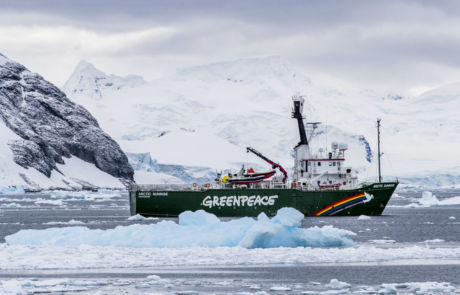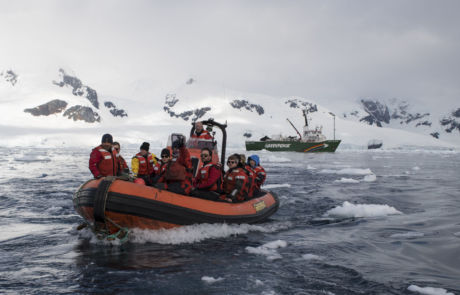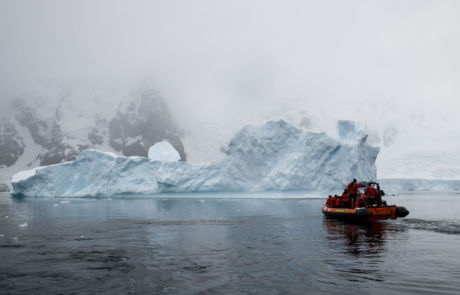UM in Antarctica with Greenpeace
Greenpeace, the most powerful environmental organization, called on MARBEC, the UM's marine biology laboratory, to take part in a mission to Antarctica from January 5 to February 13 aboard theArctic Sunrise. This is a first for the university, which, thanks to the know-how and expertise of its scientists, will undoubtedly contribute to the preservation of one of the last marine refuges on our planet.
"This is a unique opportunity to observe Antarctic biodiversity and take action to implement a genuine policy for preserving the poles," enthuses David Mouillot, professor at the Marine Biology Laboratory (MARBEC) at the University of Montpellier and advisor for the mission.
From January 5 to February 13, Nacim Guellati, a student at UM and intern at MARBEC, will join Greenpeace for the final stage of his great expedition from pole to pole. "This is an event with enormous scientific and media impact that will contribute to the reputation of our university," adds the professor.
Environmental DNA
This unique opportunity is thanks to MARBEC's collaboration with SpyGen (see box), which was recently awarded the Companies on Campus label by iSite MUSE. Environmental DNA technology makes it possible to collect DNA fragments left behind by organisms in the water, revealing the presence of species that were previously invisible to researchers. Mediterranean, Pacific, Atlantic... MARBEC researchers have been filtering water from all the world's seas for the past two years. All that was missing was Antarctica.
"Our hypothesis is that with global warming and pressure from industrial fishing, new species are finding refuge in Antarctica, particularly during the summer months," explains David Mouillot. This new migratory behavior has been observed in mammals, sharks, and several species of fish.
New refuge area
Far from being good news, such a development, if confirmed, would not only be another warning sign of the poor health of our oceans, but also the announcement of a new threat. "If Antarctica proves to be, as we believe, a climate refuge for marine biodiversity, it is clear that it will become the target of future extraction. It is more than urgent to put protective measures in place," warns the biologist.
Today, only 2% of Antarctica is protected, leaving almost the entire continent at the mercy of the fishing and energy industries, or a new form of mass tourism which, with the melting of the ice and the opening up of new sea routes, could begin to develop. This context makes the collection and analysis of data by the scientific community all the more urgent.
Urgent protection
A heavy responsibility entrusted to Nacim Guellati, a bachelor's degree student at UM, who will board theArctic Sunrise — and not aboard the Esperanza, another Greenpeace ship, as originally planned — to take these first DNA samples in Antarctica. The young man is well aware of the political significance of this mission: "UN member states are currently negotiating a treaty on ocean protection. It is imperative that our results be used to create marine reserves in Antarctica to protect this heritage."
During these seven weeks in Antarctica, Nacim will filter water for four or five hours a day aboard a zodiac. The filters will then be stored and analyzed by researchers from MARBEC and SpyGen. "It's a very demanding mission that requires great physical and mental abilities," explains his supervisor. Nacim has been working with us for two years and has amply demonstrated his reliability and adaptability. We have complete confidence in him and will remain in constant contact throughout the mission to make the most critical decisions together."
Trusting students
At just 22 years old, Nacim will be the first UM student to participate in a mission organized by Greenpeace. This is a great springboard for his future career, which David Mouillot is delighted about: "It is essential to train the younger generations and show that the University of Montpellier has confidence in them at a time when students sometimes lack prospects and ambition. This sends a strong signal to young people."
Throughout the expedition, the young biologist will share his experience with the general public by sending daily messages and videos, which the university will relay via social media. A mission that, we hope, will be more than just a drop in the ocean!
SpyGen or the success of Companies on Campus
It was through SpyGen that the University of Montpellier and MARBEC became involved in the expedition organized by Greenpeace. A pioneer in the field of environmental DNA analysis,SpyGen set up on campus as part of the "Companies on Campus" call for projects launched by MUSE. This initiative aims to promote the development of partnerships between MUSE research units and companies by facilitating the placement of their staff directly in the research units. "The collaboration with SpyGen has enabled MARBEC to benefit from theenvironmental DNA technique with which we have now been working for several years," explains David Mouillot. Contacted by Greenpeace, the company then approached MARBEC with this proposal. This is a fine illustration of the influence and opportunities that such partnerships with the business world bring to the university.
© Paul Hilton


